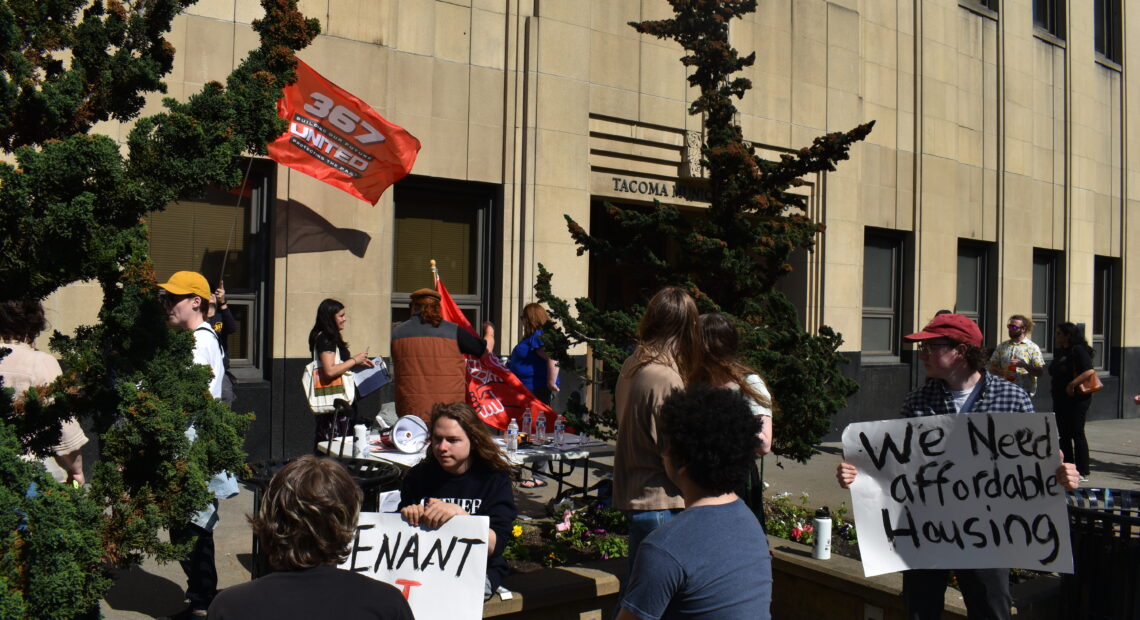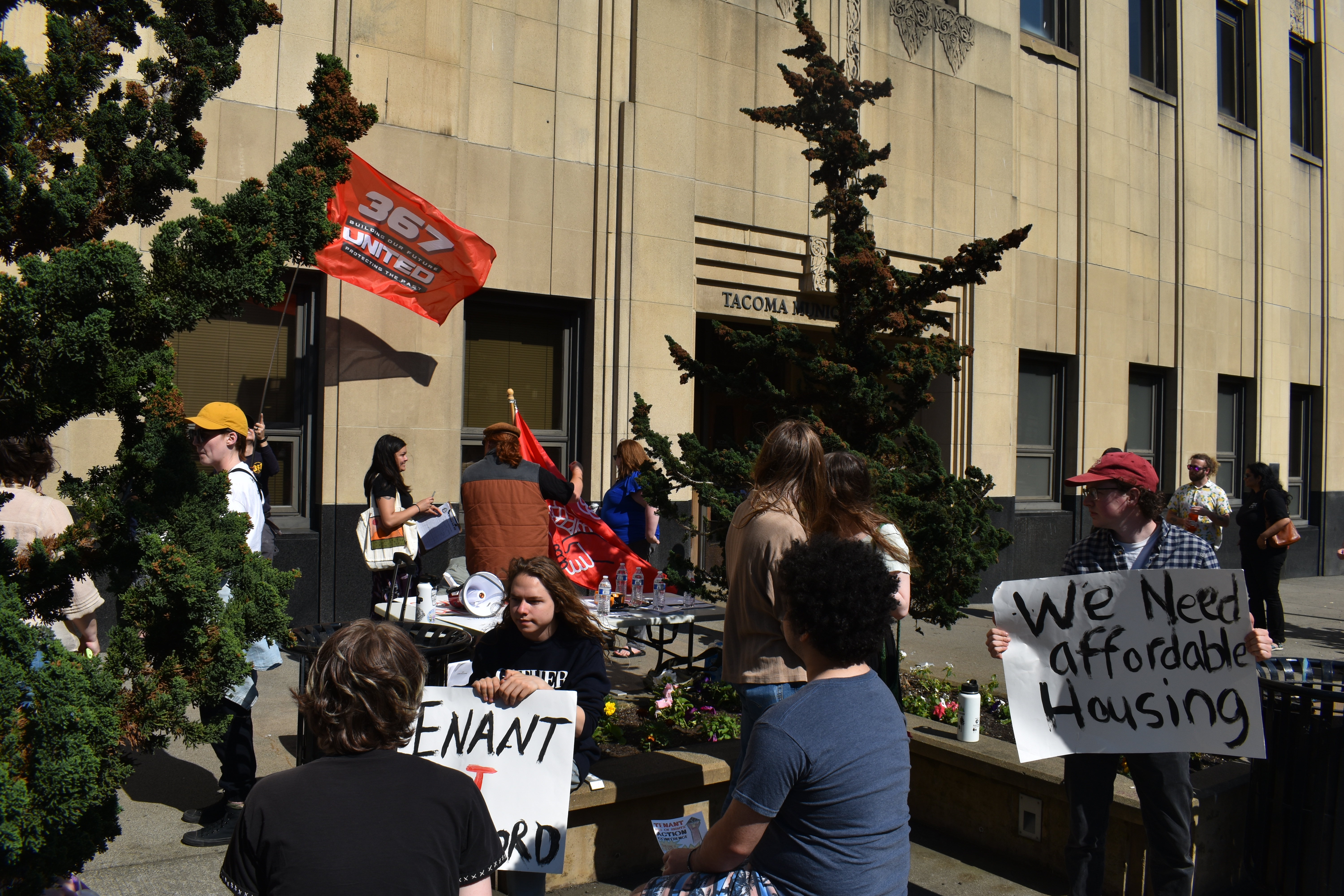
Tacoma tenant protections measure passes — now what?
Listen
(Runtime 1:02)
Read
Update Dec. 1, 2023, 2:20 PM — This story was updated to add information to listening sessions open to the public to answer questions about changes to the city’s rental housing code.
The final release of election results for Pierce County showed a victory for a set of progressive tenant protections in Tacoma.
“We feel really proud of what we’ve achieved. It was a real David versus Goliath kind of fight,” said Ty Moore, campaign manager for Tacoma For All, the group behind the initiative.
Citizens’ Initiative Measure No. 1 passed with 50.43% of the vote, a difference of just 370 votes. There was quite a strong push against the measure — $371,175.84 in expenditures were reported from “No on Tacoma Measure No. 1,” according to the Public Disclosure Commission. That’s triple what Tacoma For All spent.
“I think that the fact that folks tried so hard to defeat it, and it still passed, is an indication of where people are at,” said Washington Sen. Yasmin Trudeau of the 27th legislative district in Tacoma.
What happens now?
The Tacoma City Charter stipulates that ordinances passed by voters will go into effect 10 days after election certification — Dec. 8, this year. The new rules set forth in the measure will be added to the Tacoma Municipal Code, as stated in the initiative.
There are portions of the city’s rental housing code that differ from the regulations in the measure. Moore said city staff will need to clarify and “clean up” those confusions, but that once the measure goes into effect, that’s the law of the land and supersedes any conflicting rules in previous code.
Maria Lee, who works in communications for the city, provided the following statement: “Staff is working to review what implementation and enforcement of Measure 1 will look like in the City of Tacoma. Once that analysis has been shared with the City Manager and the City Manager has shared her recommendations with the City Council, that information will also be made available to the public.”
What does the measure do?
The measure puts tougher regulations and accountability measures on landlords.
Landlords will now need to provide two notices that they are raising rent. That will be done through a form that the measure stated the city will need to create, which will detail the dollar amount of rent increase and information on the rental relocation assistance program.
If a tenant must move because of a significant rent increase, the landlord will be required to pay what the measure calls “relocation assistance.” That is based on how much the rent is increasing. If the rent is going up by somewhere between 5% and 7.5%, the landlord has to provide two months worth of rent. If it’s between 7.5% and 10%, landlords need to provide two and a half months of rent and, finally, over 10% would equal three months of rent provided.
Landlords will also be prohibited from evicting tenants from November through March to avoid people becoming houseless in the coldest months of the year. Landlords will also be unable to evict students or their guardians and educators during the school year. There are exceptions for these eviction limits outlined in the code, including cases like sexual harassment, or if the tenant is otherwise posing a threat of health or safety to other tenants or the owner of the building.
There are a host of other regulations that can be found here. The measure does specify enforcement: Landlords who violate these stipulations can be charged with fines of at least $500 and up to five times the monthly rent, per violation.
With the measure, Tacoma tenants will see fees for late payments capped — landlords won’t be able to charge more than $10 per month for late fees.
The protections in the measure also ensure landlords cannot raise rent if they are found to be in violation of any tenant protection laws through the process outlined in Tacoma Municipal Code, or if the unit is uninhabitable. The additions to the city’s municipal code give multiple instances of legal defense for tenants against landlords, should landlords seek actions against them that are not allowed.
What’s next?
On election night, supporters of the ballot measure gathered in South Tacoma for a preemptive celebration of what they hoped would be a win.
“The only way we won was ordinary people, seeing through the lies, talking to their friends and neighbors and making sure that people understood what was really at stake here,” Moore said that night.
Now, Moore said he and the others with Tacoma For All want to make sure tenants understand what protections are afforded to them. Tacoma For All will be hosting a series of “know your rights” workshops to familiarize people, Moore said.
While the measure moved forward some of the strongest protections in the state, policy cannot fully address the issue of housing, Sen. Trudeau said. She said she would like to see more city and state investments in housing supply.
“We really do need a full spectrum of housing options to really close the loop,” Trudeau said. “Right now, we’re protecting and preserving people in their homes but the raw truth is that we need more homes. So, it’s only part of the equation.”
That was one of the major criticisms of the initiative; that it didn’t address the issue of housing supply, Moore said. While the group agreed that is a huge contributor to the crisis, Moore said private development of more housing doesn’t accommodate the needs of middle and working class people.
“We think public investment in mixed-income social housing is the only sustainable solution to the housing shortage,” Moore said.
With Seattle recently passing its social housing measure that establishes a social housing developer for the city, Moore said he wonders if Tacoma can too.
Trudeau was a strong supporter of the measure and said she thinks its success here could signal more support for similar policies across the state. Trudeau said statewide policy needs to be enacted because both property management companies and renters need continuity.
“Other tenants and other areas are going to also be able to ask their elected officials, ‘Why do Tacoma residents get protected? And we’re getting gouged,’” Trudeau said. “And I think those are going to become uncomfortable conversations for legislators and local elected officials that they’re going to need to answer.”
Trudeau said she plans to move forward an amended bill of her previous Senate Bill 5435 on rent stabilization in the upcoming legislative session.
Pierce County has some of the highest numbers of evictions in the state and there has been a surge in evictions in the past six months, according to data compiled by Crosscut. While Moore is bolstered by the fact that these tenant protections will soon be on the books, he acknowledges that for those who have already had evictions filed against them, it’s too late.
“We’re going to see a lot more people in the streets as a result of this undoubtedly,” Moore said.
The City of Tacoma announced they would be hosting two virtual information sessions regarding upcoming changes to the city’s rental housing code. Both sessions will occur on Monday, Dec. 4, one at 12pm and one at 5:30pm. Community members can find out how to attend on the city’s website.
















